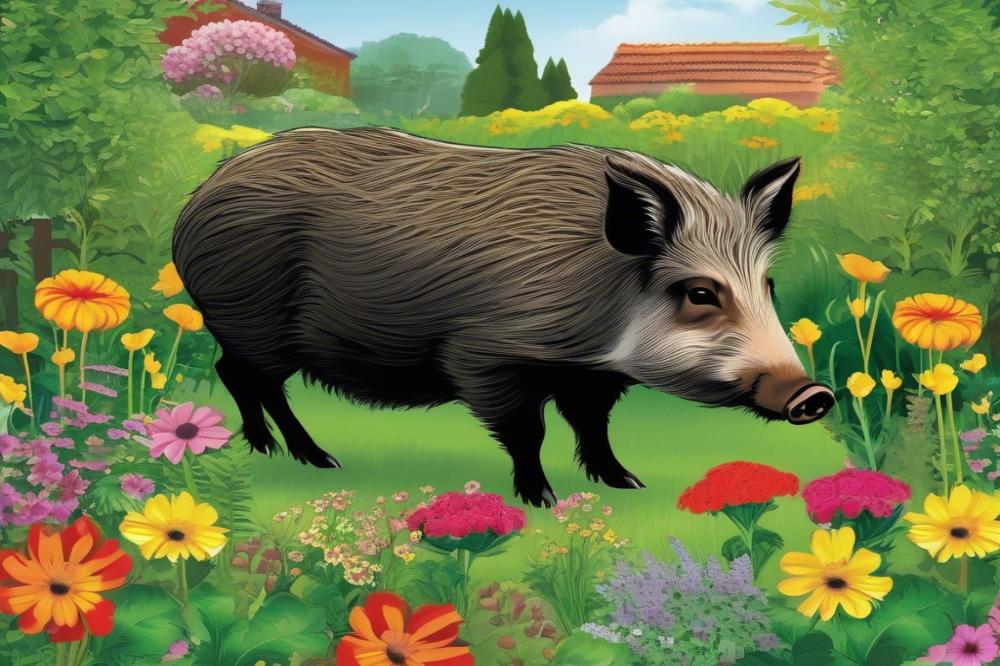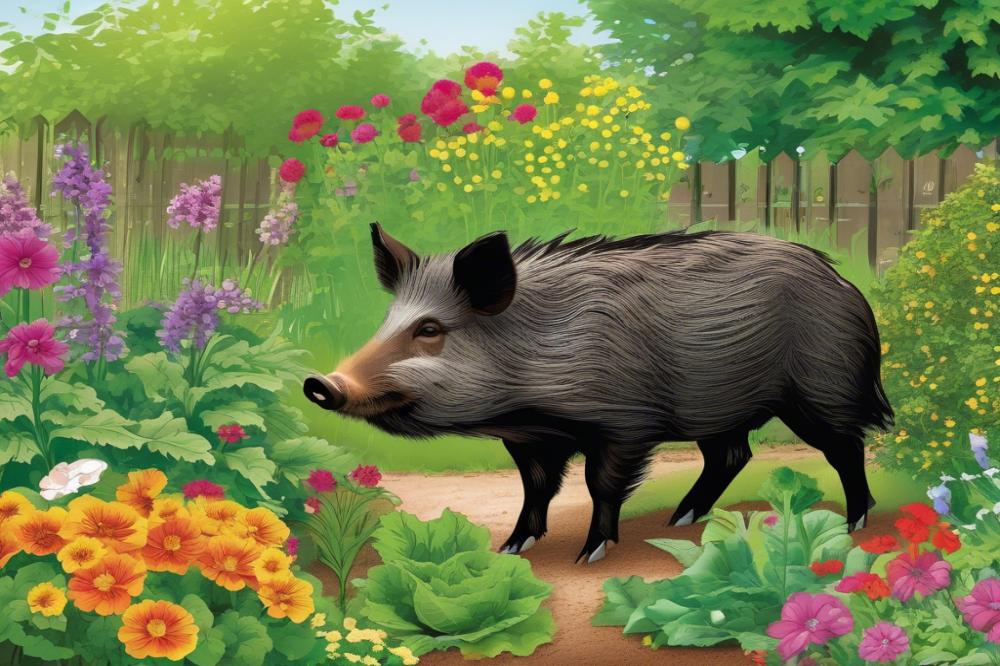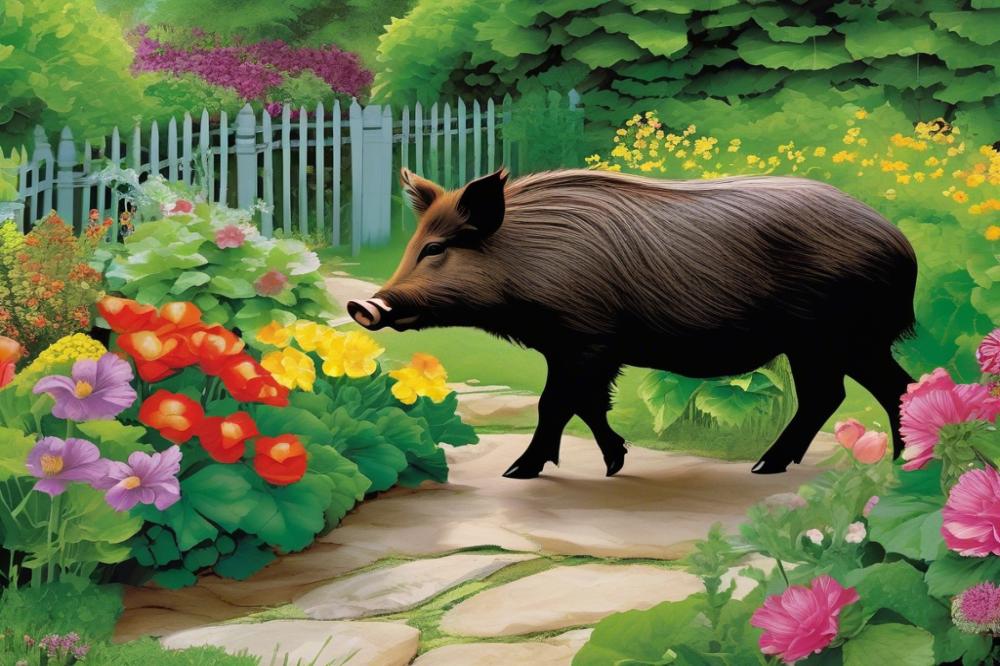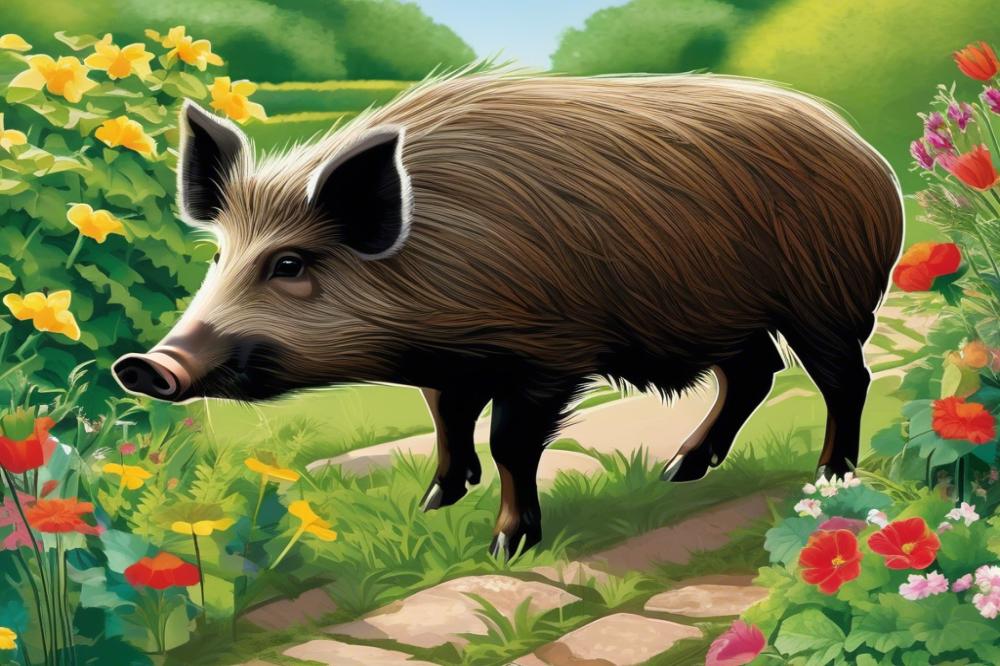Introduction
Wild boars can wreak havoc in gardens. Their strong snouts are excellent for rooting through soil, which often leads to significant damage. Homeowners may find their plants disturbed or completely uprooted, leaving behind a messy sight. These animals are not only a nuisance but can also consume a variety of plants, making a vibrant garden look bedraggled.
Preventing wild boar damage is crucial for anyone who loves to garden. Effective measures can protect your hard work and investment. A well-maintained garden not only enhances the beauty of your home but also provides fresh produce for your table. As such, understanding how to deter these creatures can lead to more fruitful gardening experiences.
This article explores various strategies to combat wild boar intrusion. We will discuss fencing options that can help create barriers, as well as animal deterrents that might keep them at bay. Additionally, gardeners will benefit from planting strategies suited to resist these foraging animals. Techniques such as habitat modification and composting tips will also be addressed to promote a more vibrant, boar-resistant gardening environment. Emphasizing garden protection means considering wildlife management practices that work effectively for your garden’s specific layout.
Understanding Wild Boar Behavior


Wild boars are creatures with distinct habits that often lead them into residential gardens. They are adept foragers, constantly searching for food. A garden filled with fruits, vegetables, and compost can quickly become a buffet for these animals. Their keen sense of smell guides them to any food source. This ability makes gardens particularly appealing and vulnerable to wild boar damage.
Several factors can raise the risk of wild boar intrusion. For example, properties near wooded areas or wetlands are more susceptible to visits. The presence of thick vegetation offers cover, making it easier for wild boars to approach without being seen. Moreover, if a garden grows food that’s overripe or easily accessible, it can attract these animals even more. Unattended compost piles may also lure them in, seeking out scraps or food remnants.
Gardeners should also look for common signs indicating wild boar presence. Disturbed soil is one of the most noticeable clues. They dig and root around in the earth, leaving behind a chaotic mess that can ruin flower beds. Additionally, you might spot tracks or trails leading into your garden. These signs suggest they have been rooting for food nearby. fencing can help deter them, but a thorough inspection of potential entry points is necessary.
Utilizing various animal deterrents can improve your chances of keeping wild boars at bay. These can include planting strategies that incorporate less attractive plants or using organic gardening methods that focus on natural deterrents. Adjusting habitat modification around your property can also be beneficial. Clearing dense brush and keeping vegetation trimmed back may discourage them from coming close.
Incorporating some effective gardening tips can be vital in preventing wild boar damage. For instance, using repellents that emit strong odors may help. Regularly checking the garden for signs of intrusion is a good practice. This vigilance will provide an opportunity to act quickly if boars begin to intrude. Understanding animal behavior is crucial in implementing the right strategies to guard your garden.
Composting tips can also make a difference. Ensure that bins are securely closed and the content doesn’t include food that could attract wild boars. By following these recommendations, you can maintain a beautiful garden while minimizing the risk of unwelcome wildlife visitors.
Effective Fencing Solutions


Strong and secure fencing stands as a primary defense against wild boar damage in your garden. Without effective barriers, these animals can easily invade and destroy your carefully tended plants. It is essential to choose materials and designs that specifically target wild boar behavior.
Types of Fencing that Deter Wild Boars
When selecting fencing, several types can discourage boars from entering your property. Heavy-duty wire mesh fences offer a solid option, providing strength and durability. Another effective choice is an electrified fence, which delivers a mild shock to deter animals from approaching. Additionally, wooden fencing can work if built high enough and reinforced at the bottom. Installing a fence that stands at least 3 to 4 feet tall helps prevent jumping, while sinking the bottom into the ground prevents digging.
Best Practices for Installing Garden Fencing
Proper installation plays a huge role in the success of your fencing. Decide on the perimeter of your garden before you begin digging. Always place the posts deep in the ground to withstand pressure. Think about the angles and corners to avoid weak points that wild boars could exploit. Maintaining tension in wire is also critical, as a loose fence may invite unwanted guests. Consider using additional animal deterrents, like planting thorny shrubs or utilizing height to your advantage.
Maintenance Tips to Ensure Long-Term Effectiveness
Once you have your fencing set up, maintenance should not be overlooked. Regularly inspect the fence for any signs of wear or damage. Repairing holes promptly can save you from future problems. Keep an eye on the vegetation nearby, as overgrowth might make it easier for animals to hide and breach defenses. Wildlife management also includes keeping the area around the fence tidy, which can discourage boars from venturing close. Composting tips can help in this aspect by reducing food availability near your garden.
Implementing these fencing strategies will greatly help in maintaining your gardening peace. Remember that while repellents and other methods are handy, nothing beats a well-constructed barrier to protect your plants. When combined with planting strategies and habitat modification, your garden can thrive despite the presence of local wildlife.
Utilizing Repellents and Animal Deterrents


There are many products designed to keep wild boars away from gardens. These include both natural and chemical repellents. Natural options often rely on scents or tastes that animals find unpleasant. They might consist of ingredients like garlic or hot pepper. Chemical repellents, on the other hand, often use synthetic substances. These can be effective but sometimes raise concerns about safety and environmental impact.
Pros and Cons of Various Deterrents
Natural repellents tend to be safer for the environment and won’t harm beneficial creatures. They can be less effective in heavy rain or extreme temperatures. Chemical deterrents might offer quick results but can pose risks to pets and children. Efficacy can vary based on the specific product. Success depends on how often you apply it, according to the label instructions. Think about your preferences when choosing repellents.
Application Methods for Best Results
To achieve the best results, apply repellents just before perceived activity periods of wild boars, such as dusk and dawn. Spraying the repellent around the perimeter of your garden can create a barrier. Make sure to focus on areas where you have noticed signs of wild boar damage before. For long-lasting effects, reapply after rain or every two weeks. A simple garden tip is to use a spray bottle, allowing you to control the amount and ensure even coverage.
Combining Deterrents for Increased Efficacy
Sometimes, it helps to use more than one method. Combining different types of repellents may confuse the animals and enhance effectiveness. For instance, mixing a repellent spray with physical barriers like fencing can create a robust defense. Adjusting your planting strategies can also make a difference. Placing less desired plants on the outer edges of your garden can act as an additional line of defense.
Habitat modification is another tactic to consider. Reduce attractive features in your yard, such as easily accessible compost heaps. Wildlife management focuses on creating environments where wild animals don’t feel welcome. Incorporating these various methods can help you maintain a healthier garden.
Planting Strategies to Discourage Wild Boars


Choosing the right plants can significantly reduce wild boar damage. Certain plants tend to be less appealing to these animals. For example, herbs like rosemary and lavender are often unappetizing to wild boars. Planting these can create a barrier that makes your garden less attractive.
Creating a thoughtful layout is essential for protecting vulnerable plants. Grouping more desirable plants together can help concentrate their appeal, while the less enticing plants surround them. If you position edible crops in the center and surround them with natural repellents, this means a level of safety for your garden’s most treasured plants.
Timing is crucial in this situation. Planting crops at times when wild boar activity is low can protect them from potential damage. Research local wild boar patterns, especially during feeding seasons, to determine the best times for planting.
Companion planting provides a fantastic opportunity for natural pest control. This gardening method involves planting specific crops next to each other for mutual benefits. Pairing plants like marigolds with vegetables can not only deter unwanted pests but might also make your garden less appealing to wild boars. Explore various combinations to find a mix that works well for your particular environment.
Habitat modification plays a role in how successful your efforts can be. Consider making adjustments around your garden space. Removing dense brush and tall grass can limit areas where wild boars may forage. Additionally, clearing debris and clutter can reduce hiding spots and potentially discourage their presence.
Don’t forget about the value of fencing. A sturdy fence can act as a physical barrier against curious wildlife. Ensure that it is tall enough and buried at least a foot below ground to prevent digging. Incorporating additional deterrents, like motion-activated sprinklers or noise makers, can enhance your defenses.
Composting tips can also contribute to wildlife management practices. Avoid using kitchen scraps in your compost, as these may attract wild boars. Stick to yard waste and safe plant materials to reduce the chances of drawing them near.
When implementing these planting strategies, consider utilizing organic gardening practices. Natural animal deterrents can help maintain a healthy garden while keeping wild boars at bay. Use plants that naturally repel these creatures as part of your overall plan to safeguard your garden.
Habitat Modification and Wildlife Management
Making your garden less inviting for wild boars involves several habitat modification strategies. First, think about the layout of your garden. Dense vegetation can attract these animals. Keeping areas open and well-maintained can reduce their desire to visit.
Reducing available food sources plays an essential role in deterring wild boars. Secure garbage cans tightly to prevent easy access. Composting tips can also help. Avoid using food scraps in your compost pile, as they can attract unwanted wildlife. Instead, focus on plant-based waste that doesn’t emit strong odors.
Planting strategies matter too. Select plants that are less appealing to wild boar. Consider using thorny or strong-smelling species, which can act as natural repellents. By changing the types of plants in your garden, you create an environment that is less attractive to these animals.
Implementing Wildlife Management Techniques Effectively
Wildlife management goes hand in hand with habitat modification. Using animal deterrents can significantly reduce wild boar damage. Motion-activated sprinklers or noise devices are examples of effective deterrents. These tools startle the animals, discouraging them from entering your garden.
Fencing is another crucial method. Building a strong fence around your garden can keep wild boars out. Use sturdy materials that they cannot easily break through. A fence stands as both a physical barrier and a visual deterrent.
Educating yourself about the behavior of wild boars helps in planning these strategies. Observing their patterns can reveal when they are most active. Utilize this information to secure your garden during peak times. Always be aware of changes in wildlife behavior as seasons change.
Composting Tips for Organic Gardening
Composting can be a wonderful addition to your organic garden. It helps enrich the soil while reducing waste. To prevent wild boar damage, consider the materials you include in your compost. Avoid adding meats, dairy, or strong-smelling food scraps. These items can attract wildlife, including wild boars. Instead, focus on plant-based scraps, yard waste, and coffee grounds. These are less likely to lure in unwanted animals.
Best Practices for Composting That Deter Wild Boars
Using a well-managed compost pile is crucial. Keep it clean and turned regularly to maintain a low odor. Adding plenty of carbon-rich materials, like leaves and straw, will help balance the nitrogen-rich scraps. This balance keeps the compost from becoming a smelly attraction. If possible, consider using a compost tumbler. Tumbler units often mix contents effectively while keeping critters out.
How to Secure Compost Bins to Prevent Access
Securing your compost bins is vital for successful wildlife management. Select bins that come with a solid lid. The lid should fit tightly to prevent any animal from accessing the materials inside. Some gardeners choose to place compost bins inside fenced areas. A sturdy fence that stands at least 4 feet high can discourage most wildlife. Adding an underground barrier can further deter burrowing animals.
Maintaining an Organic Garden While Protecting It from Wildlife
Adopting effective planting strategies can also offer protection. Surrounding your plants with certain herbs or flowers may help repel unwanted animals. For example, marigolds are known to deter various pests. Additionally, using natural animal deterrents can prove useful. Options like garlic spray or chili pepper mixtures can discourage wildlife from approaching your garden.
Habitat modification is another essential part of the process. Clearing away fallen fruits, nuts, or other attractive items from the garden area can eliminate food sources for wild boar and other species. Keeping the garden tidy reduces the likelihood of unwanted visits. Implementing these garden tips will help create a thriving space that is less appealing to curious wildlife.
Wrapping Up: Effective Strategies for a Boar-Free Garden
Combating wild boar damage requires a thoughtful approach. Several effective strategies can greatly reduce the likelihood of garden destruction. Fencing stands out as one of the most reliable methods. A tall, sturdy barrier helps keep boars at bay. In addition, planting certain herbs can deter these animals, as they tend to avoid strong scents.
Mixing different prevention methods yields the best results. Use auditory devices to scare away boars while simultaneously applying repellents to plants. This layered defense enhances your chances of maintaining a healthy garden. The combination of physical barriers and natural deterrents works well together.
Coexistance with wildlife is also vital. Understanding that wild animals are part of the ecosystem helps foster a respectful relationship. Maintaining a beautiful garden can be achieved while allowing nature to thrive. By taking proactive measures, you can protect your plants and enjoy the natural world around you.



